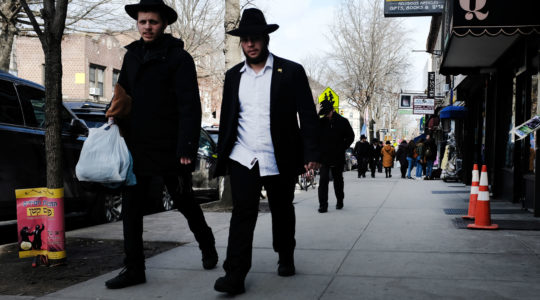
[Ed. Note: Click to read a gross of articles written by or about Murray Zuckoff.]
My introduction to Murray Zuckoff, of blessed memory, was the ash tray that adorned his desk at JTA.
The concave triangular brass dish with rounded corners depicts the Biblical story of Eliezer meeting Isaac’s wife-to-be, Rebecca. The primary colors are plain and cartoonish, but simultaneously brilliant; not unlike Zuckoff himself.
JTA’s 60th anniversary booklet includes black and white snapshots of a man seated in front of a typewriter, sporting an ordinary button down shirt, an enormous beard and round grizzly-like features. Following his death from lung cancer in Dec. 26, 2004, a JTA obituary described Zuckoff’s look as “popular among intellectuals of the era.”
“In those days, you didn’t just make a statement,” said Aviva Cantor of her late husband’s journalism career. “You did learning and research; everything from class struggle in ancient Rome to present time,” she explained. “Jewish journalism is not just about facts; it’s about mosaics, and how everything fits into this mosaic.”
“He had a gruff exterior, but he had the nicest interior,” said Dr. Adena Berkowitz, a lawyer and founder of Kol HaNeshamah Jewish Center, in the days following Zuckoff’s death.
Zuckoff mentored young writers in the organization, often letting them run with their own story pitches.
“I always felt it was more in pursuit of a story,” Berkowitz elaborated of his reputation as a tough individual. “He just was a sweetheart to me,” she stated, “but he was the consummate professional; he had high expectations of everyone.”
Zuckoff’s chief contribution to the 60th anniversary booklet was a retrospective called “JTA: The Eyes and Ears of the Jewish people,” a tagline borrowed from Pennsylvania Supreme Court Justice Horace Stern. In the essay, Zuckoff reiterates the mission of JTA while lauding the organization’s ability to keep current with the latest technological advances in newswire and printing services.
Zuckoff travelled to the Soviet Union and to South America to explore the possibility of establishing bureaus there, an idea that was ultimately nixed for budgetary reasons. While in South America, noted his widow, Zuckoff facilely interacted with local Jews in Yiddish, his native tongue.
Much as Zuckoff was determined to present the truth, he was keenly aware of JTA’s power to affect how the tiles were placed. Not one to shy any away from an issue, he was known to exercise prudent discretion when he thought disclosure would compromise the well-being of Jews. He delayed reporting the escape of Ethiopian Jews through Sudan, and an effort by Jewish leaders in Argentina to split the community’s vote between a fascist candidate and his opponent in a forthcoming election.
Perhaps owing to his socialist-Zionist upbringing, Zuckoff made a point of being one with the people. To that end, Zuckoff eschewed a private office at JTA, opting instead to sit with the writers amid the smoke and clacking of manual typewriters and welcoming the interruption of anyone who walked through the doors with a story to pitch.
“The atmosphere was so convivial,” recalled Aviva, who wrote for the organization beginning in the late 1960s.
JTA and Zuckoff parted ways in 1987 after a bitter break-up involving a pension dispute and a lawsuit over alleged age discrimination.
Beyond the caricature of a gruff, cantankerous veteran journalist, Zuckoff was a fundamentally gentle man who mentored young writers and even found it in his heart to rescue a few cats off the street. The full extent of his kindness wasn’t known to Aviva until after his death, as she tearfully relayed in this anecdote:
When we lived on 106th and Broadway, it was going through rough time: drugs, crime, and an awful lot of street people and panhandlers — I’d always give them a quarter or something. After [Murray] died, people told me he took these people to lunch in local diners. I mean, who does that?

Help ensure Jewish news remains accessible to all. Your donation to the Jewish Telegraphic Agency powers the trusted journalism that has connected Jewish communities worldwide for more than 100 years. With your help, JTA can continue to deliver vital news and insights. Donate today.





